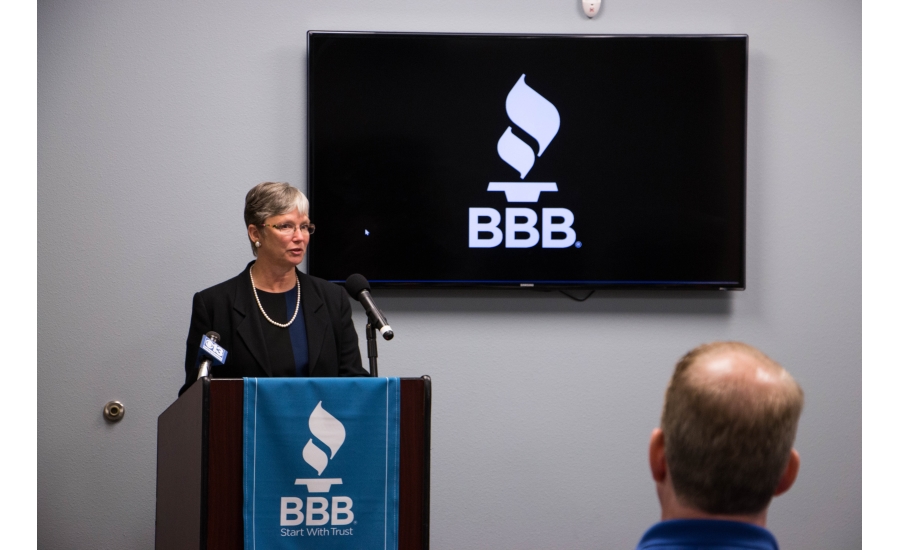BBB, ADT & Trade Associations Help Consumers Fight Deceptive Door-to-Door Alarm Sales

Lynn Conner, interim CEO of BBB serving Northeast California, addresses those present at the event.
PHOTO COURTESY OF THE SACRAMENTO BBB

Bill McCullough, scam victim, North Highlands, Calif., explains how he was targeted by unscrupulous sales people.
PHOTO COURTESY OF THE SACRAMENTO BBB

Jay Hauhn, executive director and CEO, The Monitoring Association, explained that a few unscrupulous sales reps are giving a black eye to an entire industry and what is being done to stop the deceptive practices.
PHOTO COURTESY OF THE SACRAMENTO BBB

Marie Marshall of Sacramento explains how she fell prey to a deceptive salesperson and is now locked into a 60-month contract with the new company at a higher rate.
PHOTO COURTESY OF THE SACRAMENTO BBB




With thousands of consumers victimized by fraudulent door-to-door home security sales every summer, the Better Business Bureau, with the help of ADT and several industry associations, is sounding the alarm about deceptive tactics.
Reaching a national audience May 9 from Sacramento, BBB, local victims, and leaders of two security industry associations, the Monitoring Association (TMA) and the Electronic Security Association (ESA), along with ADT, ranked No. 1 on the SDM 100, joined forces to raise awareness among consumers.
“Consumers should feel safe wherever they are,” said Mary E. Power, president and CEO of the Council of Better Business Bureaus. “When a con takes advantage of people, literally at their front door, it poses a significant challenge. We appreciate the industry taking a lead on helping BBB address these deceptive sales tactics.”
BBB was represented today at the Sacramento event by Lynn Conner, interim CEO of BBB serving Northeast California, who echoed Power’s thoughts: “We hope our outreach will educate consumers on what to do when they encounter someone using deceptive sales tactics at their front door.”
In 2016, more than a half million consumers across North America used BBB resources to research information about home security companies. But thousands also complained about dishonest and misleading sales pitches.
Speaking out today was victim Marie Marshall. The 86-year-old was deceived into switching her ADT service to another company which the salesman falsely claimed was affiliated with ADT. Marshall is now in a 60-month contract with that company, paying a higher monthly rate.
“By the time I realized I had signed with another company, it was too late,” said Marshall. “I am very disappointed that I got duped into doing business with a company that practices deceptive sales.”
BBB shared tips for consumers who are considering a home security system (bbb.org/homesecurity), and also released advice to potential employees who are being recruited to spend their summers knocking on doors (bbb.org/alarmsales).
“We urge those who are selling security systems to abide by the BBB Standards for Trust,” said Conner. “Tell the truth, honor promises and embody integrity.”
The conference was designed to help spread the word about these deceptive practices in order to put pressure on security companies to help suppress them and also to alert potential victims to what is being done so they can avoid falling prey to a deceptive salesperson. “The purpose is really about public outreach and education,” said Bob Tucker, ADT public relations director. “One of the victims, Marie, told me she didn’t even know about [deceptive sales practices]. We hope that by doing this [conference], those in the industry will hear about this and know that we are taking this seriously. If they are going to be doing door-to-door sales and acting deceptively, there could be some consequences.”
Jay Hauhn, executive director and CEO, TMA, said at the conference, “We are in the life-safety business where credibility is incredibly important. So, it pains me, greatly, to hear about how a few unscrupulous sales reps are giving a black eye to an entire industry that I dearly love.”
The reason, Hauhn said they are tackling it in this type of joint conference is that getting the word out not just to member companies but to consumers is of primary concern. “Neither ESA nor TMA have a broad reach directly to consumers, which is exactly why we are doing this, partnering with the Better Business Bureau and the way it is being streamed to all the Better Business Bureau offices, and then the program that ADT has to make their own customers aware of it — they do it through billing inserts, they do it through the messaging they give to their customers. Raising consumer awareness is a real challenge.”
Tucker said, “It’s OK to be repetitious. It feels like we say the same thing every year, but we also feel like we are making a difference, and the numbers of complaints are going down. We saw it nationally with the BBB going from 600,000 to about the 500,000 range, and we saw it at ADT go down as well. In the last couple years we have been in the 5,500 range; last year we were less than 4,000. So we do believe it is making a difference, but we are not out of the woods yet.”
As encouraging as that drop is, Tucker said he believes that represents only about 4 to 5 percent of those who have been scammed, because people are embarrassed sometimes or they don’t know what to do or who to call. “We believe there are a lot more out there than the ones we are hearing about and tracking.”
Merlin Guilbeau, executive director and CEO, ESA, added, “The ESA Code of Ethics and Standards of Conduct is our industry’s stake in the ground. It says that you cannot be a member of our association if your company engages in deceptive, misleading, unlawful or unethical business practices.”
Guilbeau explained that ESA members must sign that they agree with the Code of Ethics and Standards of Conduct. “It is our expectation that ESA members will take this code seriously and continually make it part of their company’s culture and way of doing business.
In addition to the Code of Ethics and Standards of Conduct, ESA has also come up with a complaint procedure that consumers and members can file. “It is also our expectation that if there is a failure other ESA members and consumers will take the appropriate steps by following the process outlined in the code and file a complaint so that ESA may take appropriate action,” Gilbeau said.
The problem, Gilbeau said, is not with the practice of door knocking, but with the few people who are doing it unscrupulously. “Let’s be clear...we are not ‘knocking’ door-knocking. Door-to-door selling is a very effective tool, practiced for decades in our industry. But it needs to be practiced the right way, with honesty and integrity.”
While only about 2,500 of the industry’s 12,000 companies are members of ESA, Gilbeau said ESA’s goal is that members utilize this process and file complaints when they have issues so ESA can take action when necessary. “We’ve only had a handful that have actually filed, and in all the cases we have been able to rectify the situation between the company and the consumer.”
Gilbeau added that companies in the industry need to police their own people, and when these practices happen, deal with it and discipline the employees for doing it — all the way up to termination. “There are companies that when they find out this is happening, they deal with it. Some of them will allow the customer to go back to ADT and even in some cases make them whole financially. Those companies are trying to police their own. And then there are companies like you saw in the video [of the Inside Edition special on deceptive sales practices in the security industry] that are training people to do this. That’s the root of the problem.”
Looking for a reprint of this article?
From high-res PDFs to custom plaques, order your copy today!









